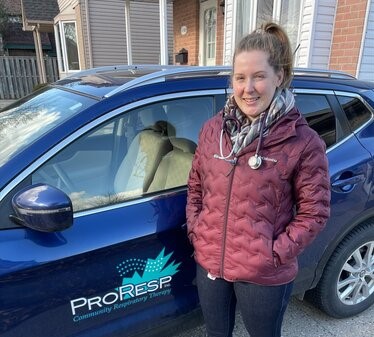
When we think about respiratory therapists in the pandemic, we imagine the ICUs at capacity with COVID patients. But the respiratory therapy frontlines extend beyond just hospitals — these specialized health care workers are often in the community assessing patients in their homes.
Chelsea Mott is a 2019 Michener Respiratory Therapy grad who works in London, Ontario for Pro Resp, an organization that provides respiratory care to communities across the province. In her role, Chelsea travels to patients’ homes where she performs complex care such as oxygen therapy, tracheostomy tube changes and assessing patients on ventilators.
“A lot of patients want to be out of the hospital and at home,” Chelsea says. “We’re trying to keep patients in their community where they prefer to be.”
With COVID-19, the ability to assess patients at home has been an essential way to manage hospital capacity and open up beds for patients who need full-time critical care.
When the pandemic hit, hospitals and physicians in Ontario reached out to Pro Resp and asked respiratory therapists to work with patients who could manage being at home. Therapists like Chelsea visit these patients and send a detailed assessment back to the doctors.
“We were able to take over the care for these patients and keep the workflow moving for the doctors. I worked with COVID patients who had been discharged from the hospital but still needed oxygen, and it was so clear that they appreciated being in their own home.”
To monitor a higher load of more acutely sick patients safely in their homes, digital monitoring systems became a key tool. COVID-19 patients at home could download an app on their phone, enter their oxygen saturation levels and record how they were feeling. Respiratory Therapists then monitored their patients and watched for abnormal ratings. “We could keep tabs on a patient without exposing anyone to risk,” Chelsea says. “And there were definitely a few 911 calls when patients weren’t doing well.”
Initiatives like assessing patients at home and digital monitoring platforms were quick fixes to keep patients safe and hospital capacity low in the pandemic. But Chelsea hopes that these programs will stay in health care long term. “For me, the biggest thing that’s coming out of this time is how we’re managing patients,” she says. “We’re learning different ways to apply our knowledge outside of the hospital and extend it into the community.” Chelsea sees the value of keeping patients at home if they can manage on their own, and she believes this is an important approach to care.
As a recent grad in a pandemic, Chelsea had to navigate her new role quickly, but she was prepared to take it on. “Our Michener instructors always said that we are all colleagues,” she recalls. “Our situation in COVID takes a team effort, and my program really emphasized how important it is to work together across teams. I’ve had to jump into new teams in COVID, but I felt confident doing it.”
Working on the frontlines in COVID is more than just being prepared for what comes next; it’s also about feeling supported, and that’s where the Michener alumni community comes in. For Chelsea, this community was a sounding board where she could talk through her ideas and stress in her work. And for new colleagues who are also Michener alumni, Chelsea says “it’s an instant connection.”